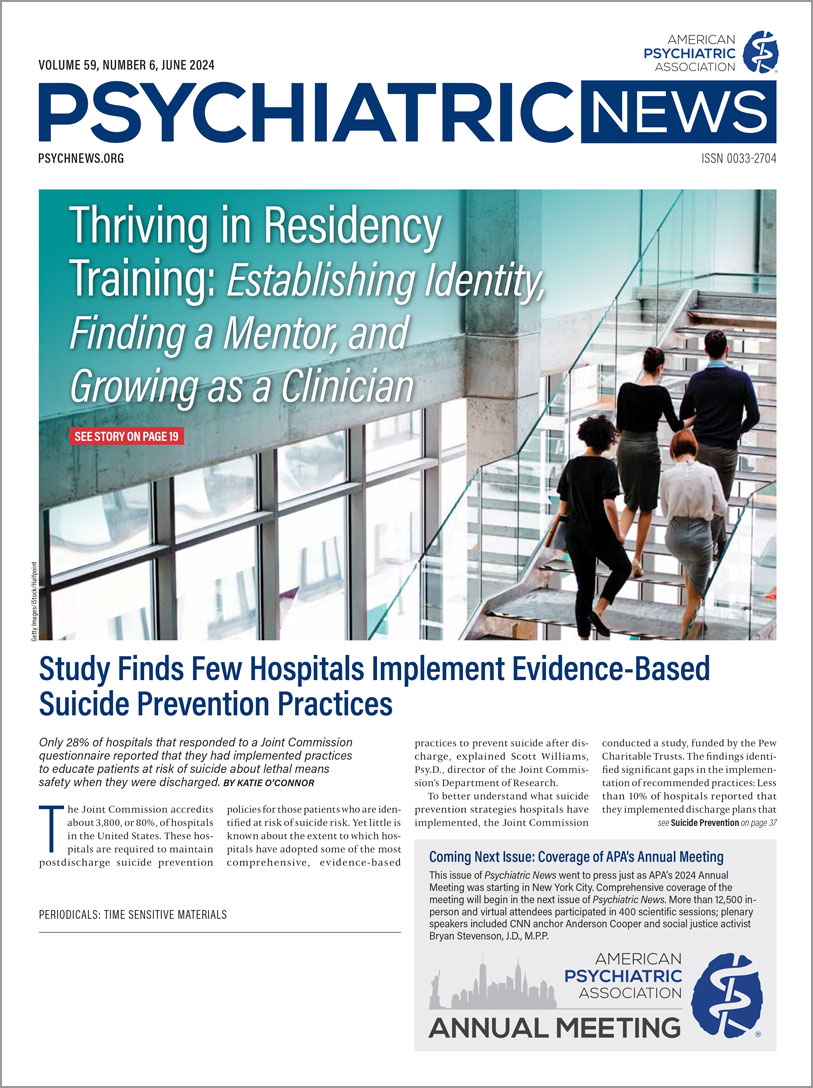Brexpiprazole Found Safe for Patients With Schizophrenia
Abstract
While the antipsychotic may soon offer a new alternative for patients with schizophrenia, experts say long-term studies evaluating how the medication compares with others on the market are needed.
Patients with schizophrenia face multiple hurdles to managing their condition. While today’s antipsychotics can offer relief from positive symptoms such as delusion and hallucinations stemming from the illness, the medications can also produce metabolic side effects, making treatment adherence and everyday life difficult.

Christoph Corell, M.D., notes that brexpiprazole is a new chemical entity with an antipsychotic-like profile.
“Schizophrenia is a complex and still all too often debilitating condition that affects approximately 2.4 million adults in the United States,” Christoph Correll, M.D., a professor of psychiatry at Hofstra North Shore-LIJ School of Medicine, told Psychiatric News. “It is important for clinicians and patients to have a range of treatment options to manage symptoms effectively and safely.”
One option that Correll hopes might soon be added to the list of viable treatments for schizophrenia is brexpiprazole, a serotonin-dopamine activity modulator that acts as a partial agonist at serotonin 5-HT1A and dopamine D2 receptors, while antagonizing serotonin 5-HT2A and noradrenaline alpha receptors. In a study published in AJP in Advance on April 17, Correll and colleagues described new findings from a phase 3 clinical trial of the drug, which indicated the efficacy and tolerability of the drug.
“Brexpiprazole is a new chemical entity,” Correll explained. Findings from preclinical studies showed brexpiprazole has an antipsychotic-like profile and suggested that the new compound has a relatively lower potential to induce D2 receptor-mediated adverse effects such as nausea, insomnia, and akathisia than other partial D2 receptor agonists. Researchers have hypothesized that such “chemical differences in brexpiprazole could improve the tolerability for antipsychotic use,” Correll said.
To test the efficacy, safety, and tolerability of the drug, Correll and colleagues randomly assigned 636 patients with schizophrenia experiencing an acute exacerbation to receive brexpiprazole (0.25 mg, 2 mg, or 4 mg) or placebo daily for six weeks.
The researchers discovered that after six weeks of treatment, patients taking 2 mg and 4 mg of brexpiprazole had, respectively, Positive and Negative Syndrome Scale scores approximately 9 and 8 points lower than those of the placebo group. Weight gain from baseline was found to be moderate among the active treatment groups, with the 2 mg cohort gaining an average of 1.45 kg and the 4 mg cohort gaining 1.28 kg. The most common treatment-emergent adverse event reported for brexpiprazole was akathisia, at a rate of 4.4 percent in the 2 mg cohort and 7.2 percent in the 4 mg cohort. No clinically or statistically significant changes were observed from baseline in lipid and glucose levels and extrapyramidal symptom ratings.
Ira Glick, M.D., a professor emeritus of psychiatry and behavioral sciences at Stanford University, praised Correll and colleagues for their research efforts. “This was a well-done study,” Glick told Psychiatric News. “Now we need to know how effective brexpiprazole will be during longer treatment periods and how it will compare with the most effective medications that are currently on the market. Only trials in the real world will determine the true effectiveness of brexpiprazole.”
As for Correll, he informed Psychiatric News that the Food and Drug Administration is expected to make its final decision on the approval of brexpiprazole for the treatment of schizophrenia as well as major depressive disorder in July.
The research was funded by Otsuka, the manufacturer of brexpiprazole. ■
An abstract for “Efficacy and Safety of Brexpiprazole for the Treatment of Acute Schizophrenia: A 6-Week Randomized, Double-Blind, Placebo-Controlled Trial” can be accessed here.



